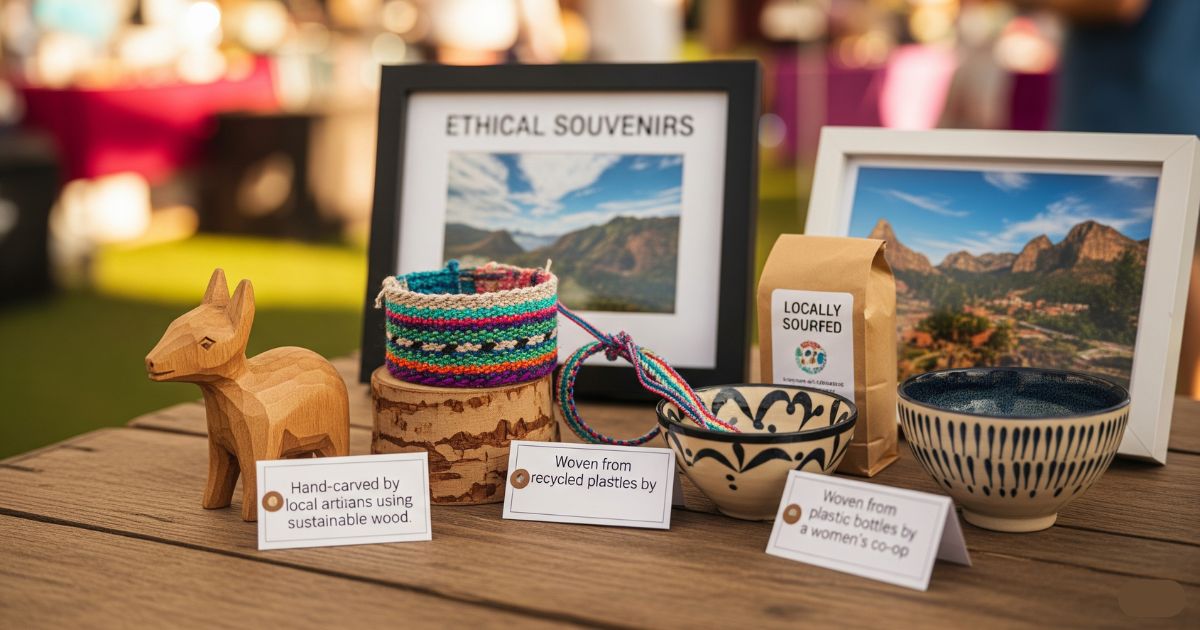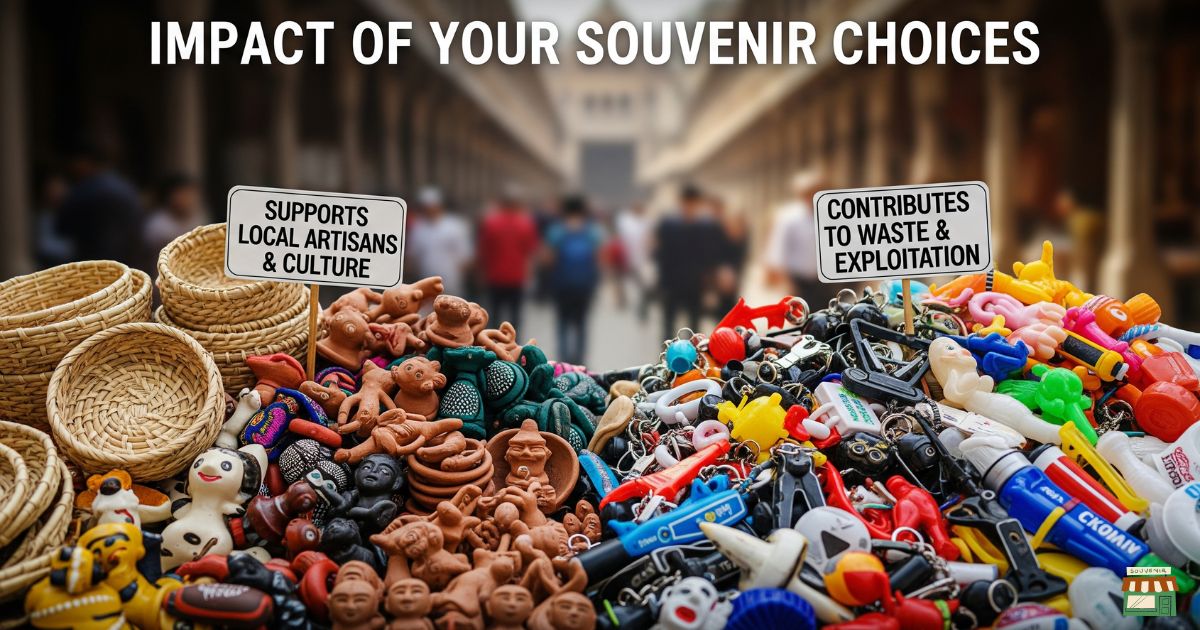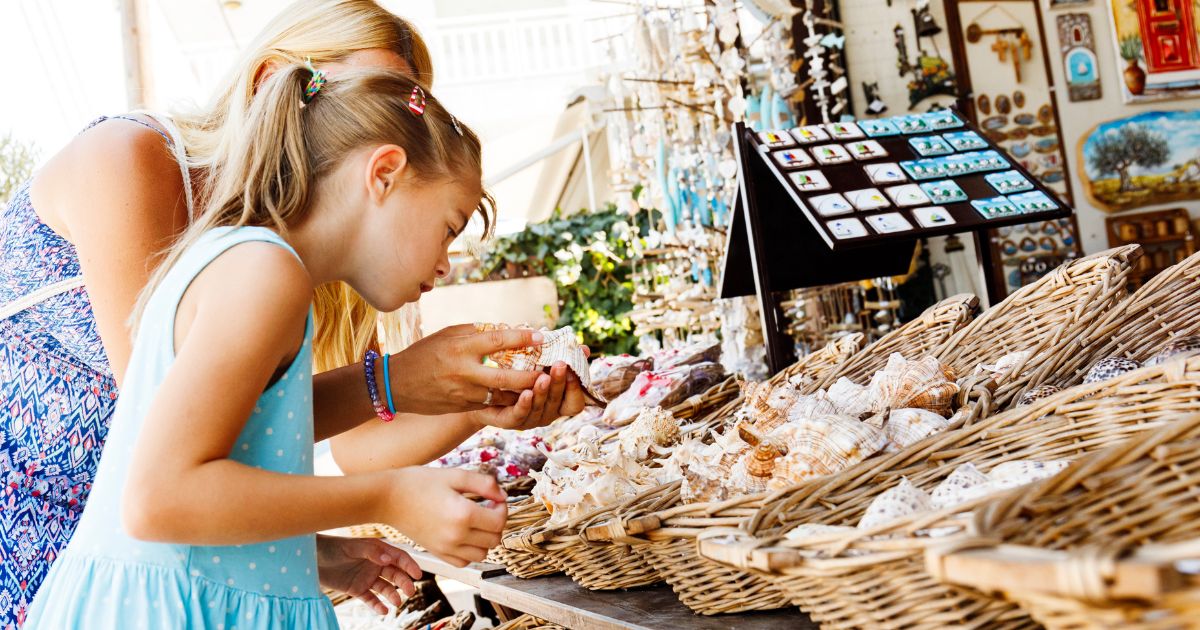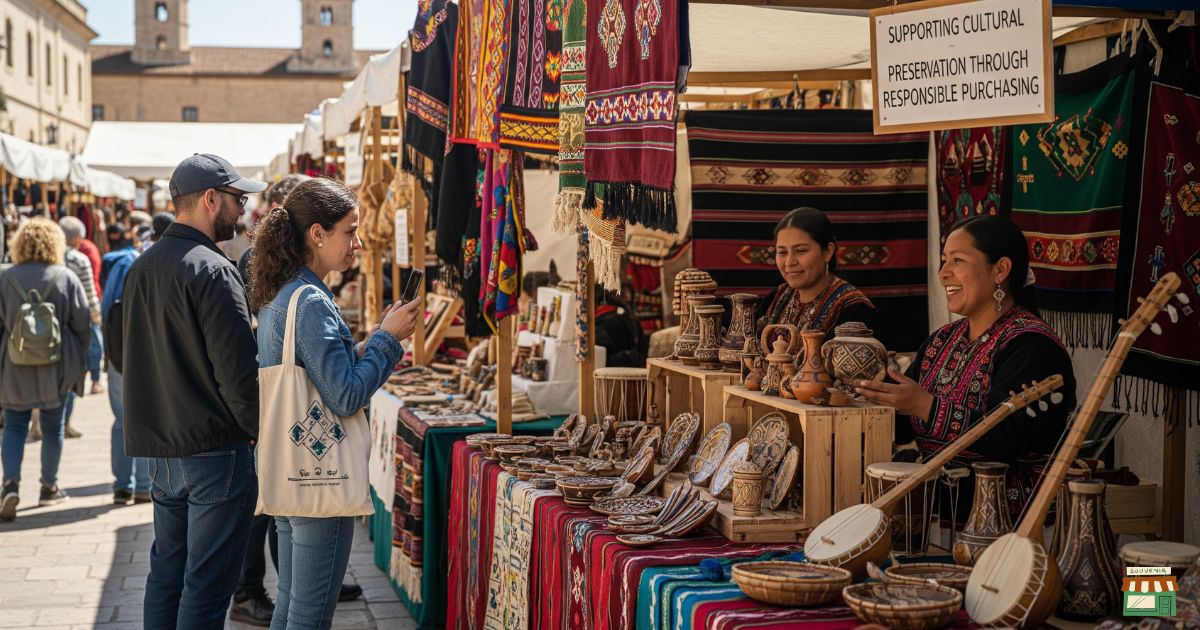
Travel opens our eyes to new cultures, breathtaking landscapes, and unforgettable experiences. But what happens when we want to bring a piece of that magic home with us? The souvenirs we choose can either contribute to exploitative practices or become powerful tools for supporting local communities and preserving cultural heritage.
Mass-produced trinkets flooding tourist markets often mask a darker reality: workers paid unfair wages, environmental damage from cheap manufacturing, and the gradual erosion of authentic cultural crafts. These items may cost less upfront, but their true price includes the exploitation of vulnerable communities and the loss of traditional skills passed down through generations.
The alternative? Ethical souvenirs that support local artisans and celebrate authentic cultural crafts. When you choose handmade goods created by skilled craftspeople in their home communities, your purchase becomes an investment in cultural preservation and economic empowerment. This guide will show you how to identify authentic souvenirs, find reputable sources, and make purchases that create a positive impact while bringing home meaningful memories.
Understanding the Impact of Your Souvenir Choices

Every souvenir purchase tells a story. The question is: what kind of story do you want your money to tell?
Traditional tourist markets are often flooded with items manufactured far from their point of sale. That “authentic” wooden mask from Kenya might actually be mass-produced in a factory thousands of miles away, while genuine Kenyan artisans struggle to compete with artificially low prices. Meanwhile, the environmental cost of shipping these items across multiple countries adds unnecessary carbon emissions to your travel footprint.
When you support local artisans, your money stays within the community where you’re visiting. A single purchase can help an artisan feed their family, send children to school, or invest in better tools and materials. These economic benefits ripple outward, strengthening entire communities and incentivizing young people to learn traditional skills rather than abandoning them for urban jobs.
Cultural preservation represents another crucial dimension of ethical souvenir shopping. Many indigenous crafts face extinction as globalization pressures communities to abandon traditional practices. By purchasing authentic handmade goods, you’re directly contributing to the survival of techniques that have been refined over centuries. Your purchase validates the importance of these skills and encourages artisans to continue practicing and teaching them.
Identifying Authentic Handmade Goods

Spotting genuine handmade goods requires developing an eye for quality and authenticity markers that mass-produced items simply cannot replicate.
Start by examining the craftsmanship closely. Authentic handmade items display subtle variations that reflect human touch—slight differences in weaving patterns, minor asymmetries in pottery, or unique color variations in dyed fabrics. These “imperfections” are actually hallmarks of authenticity. Mass-produced items, by contrast, maintain perfect uniformity across identical pieces.
Materials provide another telling indicator. Genuine artisans typically use locally sourced materials that reflect their environment and cultural traditions. An authentic Peruvian textile will likely incorporate alpaca wool, while genuine Mexican ceramics often feature clay from specific regional deposits. Be suspicious of items claiming local authenticity but made from obviously imported materials.
Price can serve as a rough authenticity gauge, though it requires contextual understanding. Extremely cheap items often signal mass production, as authentic handmade goods require significant time investment. However, avoid automatically assuming higher prices guarantee authenticity—some vendors inflate prices on mass-produced items targeting tourists willing to pay premium amounts.
Look for maker’s marks, signatures, or other personalizations that indicate individual craftsmanship. Many authentic artisans take pride in signing or marking their work, creating a direct connection between creator and purchaser. Ask vendors about the specific artisan who made an item—legitimate sellers should be able to provide at least basic information about the creator’s background and techniques.
Finding Reputable Sources and Fair Trade Options

Knowing where to shop can make the difference between supporting genuine artisans and inadvertently funding exploitative practices.
Artisan cooperatives represent one of the most reliable sources for ethical souvenirs. These organizations bring together multiple craftspeople, providing them with fair wages, marketing support, and quality control standards. Cooperatives often display detailed information about their member artisans, production methods, and how profits are distributed within the community.
Fair trade certification offers another valuable guidance system. Organizations like Fair Trade USA and the World Fair Trade Organization maintain rigorous standards for ethical production, fair wages, and sustainable practices. Items bearing these certifications have undergone thorough vetting to ensure they meet responsible production criteria.
Seek out workshops and studios where you can observe artisans at work. Many craftspeople welcome visitors and enjoy explaining their techniques. This direct interaction not only ensures authenticity but also creates meaningful cultural exchange. You’ll gain a deeper appreciation for the skill involved while artisans receive fair compensation for both their products and their time.
Local markets can offer excellent options, but require more careful evaluation. Look for vendors who can answer detailed questions about their products’ origins and construction methods. Genuine sellers typically demonstrate extensive knowledge about their merchandise and take pride in explaining the cultural significance behind different items.
Museums and cultural centers often maintain gift shops featuring authentic local crafts. While prices may be higher than street markets, these venues typically maintain strict authenticity standards and direct relationships with artisan communities.
Supporting Cultural Preservation Through Responsible Purchasing
Your souvenir choices can play a vital role in keeping traditional skills and cultural knowledge alive for future generations.
Many indigenous crafts face serious threats from globalization and changing economic conditions. Young people often abandon traditional skills for modern jobs that seem more financially promising. When authentic crafts lose market value, entire cultural traditions risk disappearing forever.
Responsible purchasing helps reverse this trend by demonstrating market demand for authentic cultural crafts. When artisans can earn sustainable incomes from traditional skills, they have an incentive to continue practicing and teaching these techniques. Your purchase essentially votes for cultural preservation with your wallet.
Consider the cultural context and significance of items you’re considering. Some crafts hold deep spiritual or ceremonial meaning within their cultures of origin. Purchasing such items requires understanding and respect for their cultural importance. When in doubt, ask vendors about the appropriate use and display of culturally significant pieces.
Document the stories behind your purchases. Many artisans are happy to share the cultural significance, traditional techniques, or personal stories connected to their work. Recording these narratives transforms your souvenir from a simple object into a meaningful cultural artifact that preserves knowledge and personal connections.
Support artisan education initiatives when possible. Some cooperatives and organizations use portions of their profits to fund apprenticeship programs, ensuring traditional skills are passed to younger generations. By purchasing from these sources, you’re investing in long-term cultural preservation.
Building Meaningful Connections with Local Communities
The most rewarding ethical souvenir experiences often involve direct interaction with the artisans themselves.
Take time to engage with craftspeople when opportunities arise. Many artisans appreciate it when visitors show genuine interest in their work and cultural background. These conversations often lead to a deeper understanding of local traditions and may result in custom pieces that reflect your specific interests or commemorate your visit.
Consider commissioning custom work when time allows. Custom pieces often cost only slightly more than standard items but provide artisans with higher profit margins and creative fulfillment. You’ll receive a truly unique souvenir while supporting an artisan’s artistic development.
Learn basic phrases in the local language to facilitate better communication. Even simple expressions like “thank you” or “beautiful work” in the local language demonstrate respect and often lead to more meaningful interactions.
Share your purchases on social media responsibly, highlighting the artisan’s story and craftsmanship rather than just showcasing your acquisition. This approach can help raise awareness about authentic local crafts and potentially bring additional customers to deserving artisans.
Maintain connections when possible. Some travelers develop ongoing relationships with artisans, commissioning additional pieces or recommending them to friends visiting the area. These relationships can provide artisans with a steady income and create lasting cultural bridges.
Common Pitfalls to Avoid
Even well-intentioned travelers can accidentally support harmful practices if they’re not aware of common traps in the souvenir market.
Avoid purchasing items made from endangered species or environmentally destructive materials. This includes ivory, certain types of coral, some tropical hardwoods, and products from endangered animals. These purchases contribute to environmental destruction and often violate international trade regulations.
Be wary of “charity” narratives that exploit sympathy without providing genuine benefit to communities. Some vendors create false stories about orphanages or community projects to justify higher prices or guilt travelers into purchases. Legitimate charitable organizations typically provide verifiable information about their programs and impact.
Resist pressure tactics that push you toward immediate purchases. Authentic artisans and ethical vendors understand that quality purchases require consideration time. High-pressure sales tactics often indicate vendors are more interested in quick profits than in customer satisfaction or ethical practices.
Avoid purchasing religious or ceremonial items without understanding their cultural significance and appropriate use. Some items hold deep spiritual meaning and may be inappropriate for casual ownership by outsiders. When in doubt, ask about cultural context and choose alternative items if necessary.
Don’t assume higher prices automatically indicate better ethics or authenticity. Some vendors deliberately inflate prices on mass-produced items, targeting tourists who associate cost with quality or authenticity. Focus on construction quality, materials, and seller knowledge rather than price alone.
Making Your Travel Purchases Count
Transform your souvenir shopping from mindless consumption into meaningful cultural exchange and community support.
Set a souvenir budget before traveling and allocate it toward fewer, higher-quality pieces rather than numerous cheap items. This approach allows you to make more impactful purchases while avoiding clutter and supporting better working conditions for artisans.
Research local crafts before your trip. Understanding traditional techniques and cultural significance helps you identify authentic items and engage more meaningfully with artisans. This preparation also helps you avoid tourist traps and focus on genuinely valuable cultural experiences.
Consider purchasing materials or tools that artisans need rather than finished products. Some artisans appreciate visitors who purchase high-quality materials that can be used to create multiple pieces. This approach often provides better value for artisans while giving you insight into their creative process.
Plan for proper transport and display of your purchases. Fragile handmade items require careful packing and may need special display considerations to maintain their condition. Proper care ensures your ethical souvenirs remain meaningful reminders of your travels for years to come.
Creating Lasting Impact Beyond Your Trip
Your commitment to ethical souvenirs can extend far beyond your immediate travel experience.
Share your positive experiences with ethical vendors and artisans through online reviews and social media posts. These recommendations can bring additional customers to deserving craftspeople and help other travelers make informed decisions.
Consider organizing group purchases among friends and family. When multiple people coordinate purchases from the same artisan or cooperative, it often allows for bulk orders that provide better income stability for creators.
Support organizations that connect international customers with local artisans year-round. Many cooperatives and fair trade organizations offer online shopping that allows continued support of artisan communities long after your trip ends.
Educate others about the importance of ethical souvenir shopping. Share your knowledge about identifying authentic crafts and supporting local artisans with fellow travelers, helping create a larger community of responsible tourists.
Consider how your ethical souvenir practices might extend to local shopping at home. The principles of supporting local artisans, choosing quality over quantity, and valuing cultural authenticity apply just as well to purchases in your home community.
Your Souvenir Choices Shape Communities
Every souvenir purchase represents a choice between supporting exploitation or empowerment, between preserving culture or allowing it to disappear, between meaningful travel memories and hollow consumption.
When you choose ethical souvenirs that support local artisans, your travel spending becomes a force for positive change. You’re not just taking home beautiful objects—you’re preserving cultural traditions, supporting fair wages, and creating economic opportunities in communities around the world. This practice also aligns closely with the values of Sustainable Travel, ensuring your impact benefits people and the planet.
The extra effort required to find authentic handmade goods and build relationships with local artisans enriches your travel experience immeasurably. These meaningful purchases become treasured reminders of genuine cultural connections rather than disposable trinkets that lose their significance over time.
Start planning your next trip with ethical souvenir shopping in mind. Research local crafts, identify artisan cooperatives, and budget for quality pieces that tell authentic stories. Your thoughtful purchasing decisions can help ensure that future travelers will still find vibrant artisan communities creating beautiful, meaningful crafts that celebrate their cultural heritage.

















No Comments